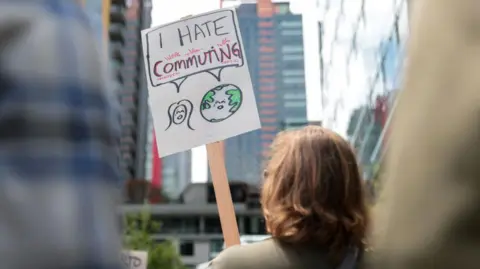 Getty Images
Getty ImagesAmazon is ordering staff back to the office five days a week as it ends its hybrid work policy.
The change will come into force from January, Amazon’s chief executive Andy Jassy said in a memo to staff.
“We’ve decided that we’re going to return to being in the office the way we were before the onset of Covid,” he said, adding that it would help staff be “better set up to invent, collaborate, and be connected enough to each other”.
Mr Jassy has long been known as a sceptic of remote work, but Amazon staff were previously allowed to work from home two days a week.
Amazon’s push to get corporate staff back into the office has been a source of tension within the firm which employs more than 1.5 million people globally in full-time and part-time roles.
Staff at its Seattle headquarters staged a protest last year as the company tightened the full remote work allowance that was put in place during the pandemic.
Amazon subsequently fired the organiser of the protest, prompting claims of unfair retaliation, a dispute that has been taken up with labour officials.
In his message on Monday, Mr Jassy said he was worried that Amazon – which has long prided itself on preserving the intensity of a start-up while growing to become a tech giant – was seeing its corporate culture diluted by flexible work and too many bureaucratic layers.
Mr Jassy, who replaced founder Jeff Bezos as chief executive in 2021, said he had created a “bureaucracy mailbox” for staff to make complaints about unnecessary rules and the company was asking managers to reorganise so that managers are overseeing more people.
Amazon said those changes could lead to job cuts.
 Getty Images
Getty ImagesIn addition to returning to the office five days a week, Amazon said it would end hot-desking in the US, although it will continue in most of Europe.
The company said staff could still work from home in unusual circumstances, such as a sick child or house emergency, as was the case before the pandemic.
But unless they have been granted an exemption, Mr Jassy said: “Our expectation is that people will be in the office outside of extenuating circumstances.”
UK approach
Amazon’s stance contrasts with the UK government’s approach, which has promised to make flexible working a default right from day one as part of a new employment rights bill due to be published next month.
Business Secretary Jonathan Reynolds told the Times newspaper that the government wants to end the “culture of presenteeism”, and said there were “real economic benefits” to people working from home.
He said there was a balance to be struck, but flexible working arrangements could help businesses recruit from a wider pool of people.
Graeme from Northumberland, who didn’t want us to use his surname, mainly works from home and believes “you just get so much more done”.
The difference between that and office work was “night and day” in terms of productivity, he said.
In the office people can come over for a chat, or to make requests, and then it can be more difficult to get back into a work flow, he said.
However, he added that the socialising aspect of working in an office was also important.
Wider shift?
Remote work peaked during the pandemic. Many companies started recalling staff in 2022, but the return has been incomplete.
As of this summer, about 12% of full-time employees in the US were fully remote and another 27% reported having hybrid work policies in place, according to a monthly survey by economists Jose Maria Barrero, Nicholas Bloom, and Steven J Davis.
Bank bosses such as JP Morgan’s Jamie Dimon have been among the most high-profile figures critical of remote work and likely to demand full-time office attendance.
But the attitude has also spread to other industries, with UPS and Dell recalling staff to the office full-time this year.
In his memo, Mr Jassy said that Amazon’s experience with its move to a hybrid policy had “strengthened our conviction about the benefits” of working in person.
But Prof Bloom, from Stanford University, said he did not think the announcements were a sign of a wider shift in work policies, noting that his data has found time spent at the office has been fairly stable for more than a year.
“For every high-profile company cancelling work-from-home, there’s others that seem to be expanding it – they just don’t get picked up in the media,” he said.

